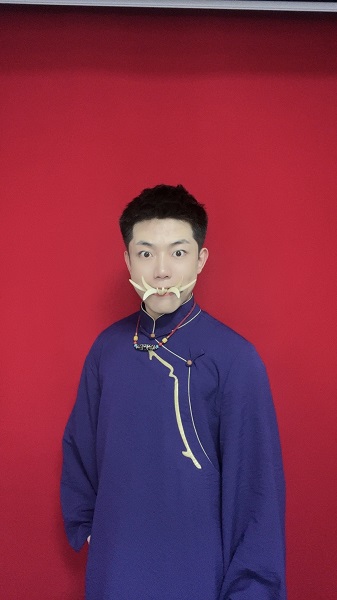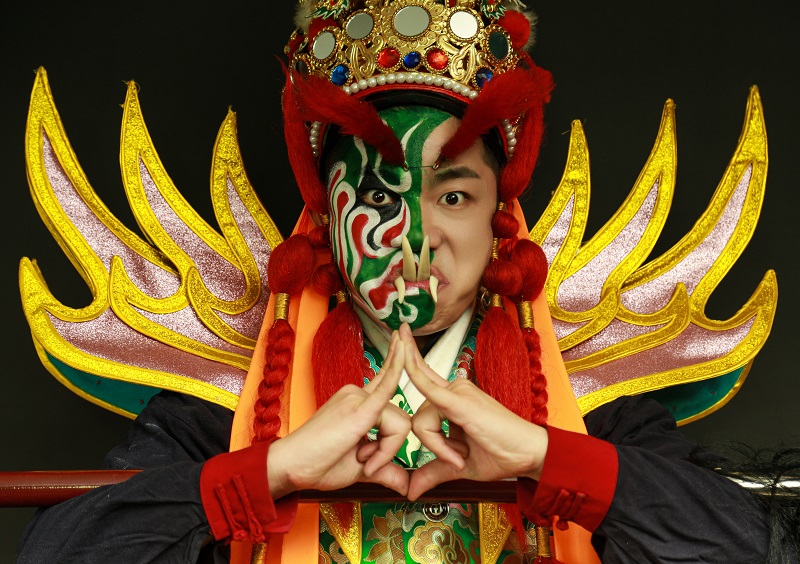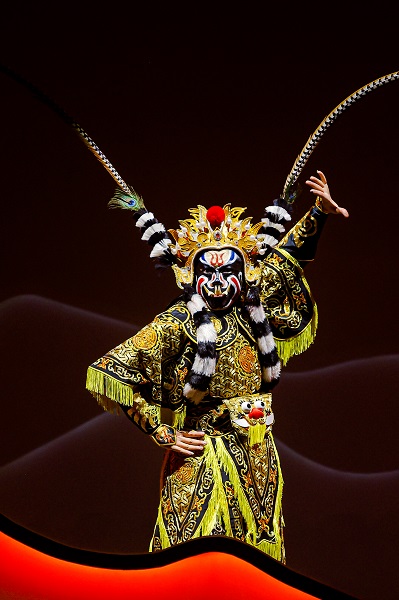A young traditional art lover is promoting an endangered Chinese opera technique despite its side effects.
Chen Shang is 24 but the Chinese opera technique he is championing to prevent its extinction is over 400 years old. It’s a unique skill called shua ya, which literally means teeth-playing. The performers have the canine teeth of male pigs protruding from their mouths and even nostrils and use their tongues and lips to move them.
Different movements indicate different emotions, usually ferocity and creepiness, since teeth-playing is mainly used by actors playing ghosts and monsters. For instance, if the teeth move back and forth or up and down, it means the character is happy.

Chen Shang
In a recent livestreaming performance, Chen started with two teeth and gradually increased them to eight, accompanied by popular singer Jay Chou’s hit song Fearless, which aptly is full of traditional images. While performing, he also replied to the comments his online viewer made on screen, sharing his know-how about teeth-playing. The genre, developed by a local opera in east China’s Zhejiang Province, has few people learning it today due to the difficulties associated with it. It may disappear one day without champions like Chen.
Overcoming Hurdles

Chen Shang posing with four teeth in his mouth and half of his face painted with facial makeup of Chinese opera.
The city of Cangzhou in Hebei Province, north China, is one of the cradles of Chinese martial arts and acrobatics, boasting abundant performance resources. Born and bred there, Chen revels in traditional folk arts. When he was a child, he fell under the spell of bianlian or face-changing technique used in Sichuan Opera, in which the actors change their masks secretly with lightning speed so that it seems they changed their faces. He desperately wanted to learn face-changing and his family sent him to study with a master. Two years later, he could perform face-changing smoothly on stage.
While trying to innovate, he saw a teeth-playing performance. On learning the amazing skill was facing extinction, he made up his mind to carry it forward. “When my face-changing skill reached a certain level, there was little room to make further progress,” says Chen, who calls himself the inheritor of the intangible cultural heritage of face-changing and teeth-playing on his social media profile. “Then I had the idea of combining teeth-playing with face-changing.”
He says Sichuan Opera has a makeup called ba’erlian for the character of youth. In this, half the face above the nose is painted, which means the audience can see teeth-playing clearly.
There are several reasons for teeth-playing losing its popularity among the players. Besides being hard to learn, one of the biggest barriers for beginners is the smell and taste of the teeth. Every time Chen started to put the teeth into his mouth, he felt like throwing up and even lost his appetite. But there was no other way than to persevere and adapt, which took him almost half a year.
Finding suitable teeth is another challenge. Since the tusks of wild pigs are difficult to find, Chen had to compromise and look for home-grown pigs’ teeth instead. However, the strength, length and angle of domesticated pig teeth often didn’t meet the standards. Moreover, since different people have different mouth structures, it is difficult to find suitable teeth. Chen had to visit many places, including pork vendors and slaughterhouses.
Then there is the harm to the performer’s mouth while playing the teeth. Chen told China Today, “During practice, my gums would get cut and bleed. My tongue also got cut and my own teeth began to loosen, with the gap between them widening.” During one of his livestreaming performances, the audience could see a crack in the corner of his mouth.
This made his parents worried. At first, they had found teeth-playing interesting but their attitude changed after Chen had injuries in his mouth and teeth. However, Chen chose to persist with his practice and playing and now thinks he has overcome the initial difficulties. Currently, he can play up to 12 teeth.
A Proud Inheritor

Chen Shang performing teeth-playing.
Teeth-playing, dating back to the late Qing Dynasty (1644-1911), is a unique technique in Ninghai Pingdiao, a local opera in Ninghai County, east China’s Zhejiang Province. Listed as a national intangible cultural heritage in 2006, it enjoys the same status as the face-changing art of Sichuan Opera among omnifarious Chinese operas, as an awe-inspiring stunt.
Even though Chen excels in teeth-playing, he received a lot of criticism from viewers when he started to post videos of teeth-playing on social media platforms. “About 80-90 percent of people didn’t know what teeth-playing was and thought it was bad as it hurt the mouth. I was under great pressure,” Chen admitted.
However, he also received encouragement from some viewers. Besides, Chen says opera players and people well-versed in traditional culture understand that teeth-playing is a distinctive skill and should be inherited and passed on to the next generation.
Chen has performed face-changing and teeth-playing in various places, from nursing homes and orphanages to schools, giving vulnerable groups and children the chance to appreciate traditional culture. Besides, he also teaches face-changing and demonstrates teeth-playing by livestreaming on social media platforms. On Douyin, the Chinese TikTok, alone, he has over 1 million fans.
Compared to face-changing, teeth-playing is much harder to inherit. Chen says the number of people learning teeth-playing is very low and even those who are successful earn little money. Still, he hopes to take the traditional culture to a bigger stage, maybe even outside China, so that more people can appreciate it.